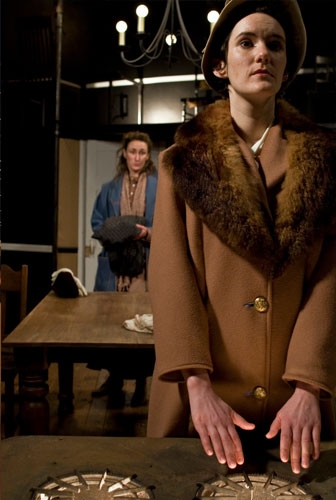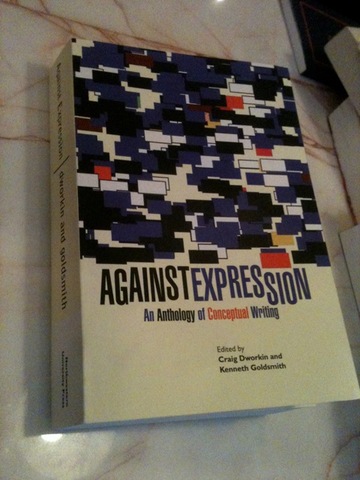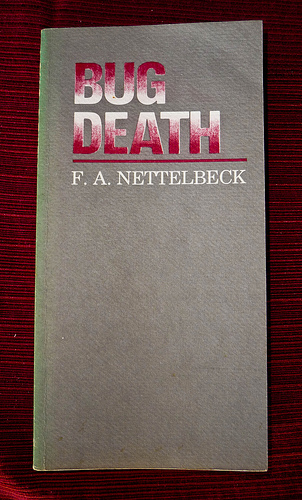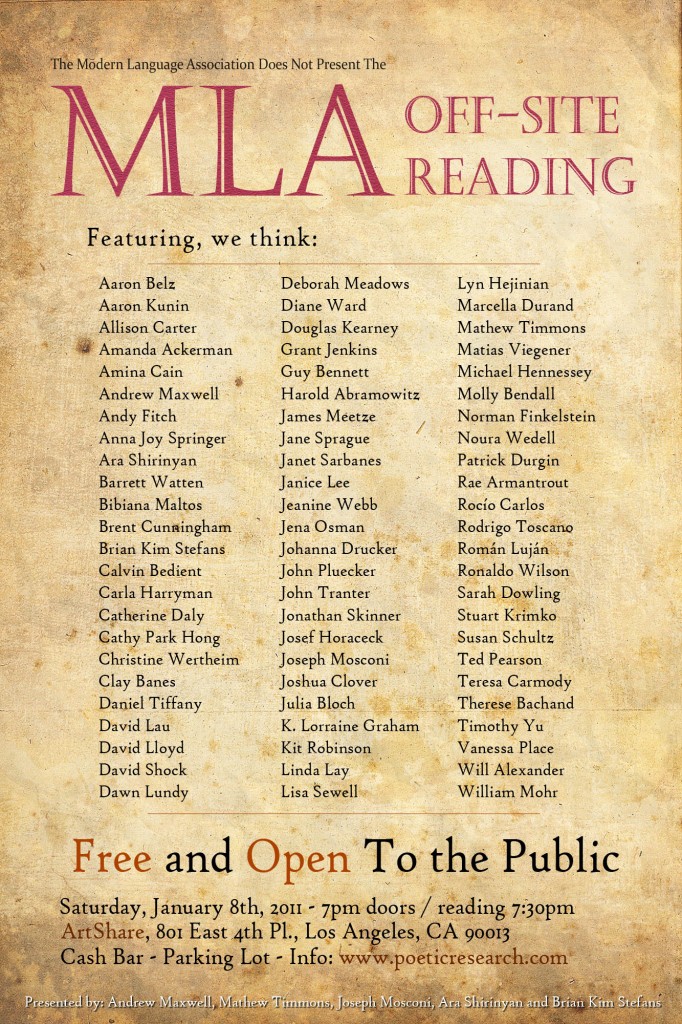January 2011
Monthly Archive
Sun 30 Jan 2011
Posted by bstefans under
BanterNo Comments
My latest proposal for the Public School, Los Angeles chapter.

This course is geared toward writers and performers who want to workshop experimental theater texts, including already published and premiered plays.
There is no set definition for what “experimental” means. I tend to favor a lot of the writing coming from Mac Wellman and the group of younger writers who engage in his brand of “pataphysical theater,” including Young Jean Lee, with whom he edited the excellent anthology New Downtown Now, published by University of Minnesota Press. I’m also a big fan of the Wooster Group, but most of the best work I’ve seen is by very small troupes in NYC, like The Theater of a Two-Headed Calf and The National Theater of the United States of America. Basically, a reading list could be based on anything that is happening in theater today that is not expressly commercial or realist in the common senses of the word. We could also look at Youtube videos and assemble some sort of library of videos of groups and writers we are interested in.
I’d also like to look at some British playwrights like Edward Bond and Caryl Churchill, and especially like to figure out what experimental theater exists in Los Angeles (you can see my blog, Free Space Comix, for my attempts to collect links about this).
The definition of “theater” itself can be rather open, especially in LA, which has such a strong tradition of performance art. My sense is that theater should, at its very base, tell a story, or appear to do so, rather than present something in a purely sculptural or phenomenal way. That is, performance art is about historical events — singular, not-to-be-repeated happenings — whereas theater seems to rely on artifice, stagecraft, the creation of ritual or narrative — perhaps “memory” — spaces, that are valuable because of their very repeatability. The writer/performer distinction seems to rarely exist in performance art, whereas it’s central to the interesting dynamic of theater, even if the writer does indeed direct or perform. But there’s no reason to essentialize.
In any case, I’d like to create a workshop in which we can do exercises in creating new interesting things for actors and directors to do. We can have readings, and play around with each others’ texts. Ultimately, I’d like to see a staging of these works.
I certainly don’t have, or want, to be “workshop leader” every week — anyone who has interesting ideas for exercises, or has some special knowledge about contemporary theater, and wants to lead a workshop should do it.
Sat 29 Jan 2011
Posted by bstefans under
AnnouncementNo Comments

Against Expression: An Anthology of Conceptual Writing
Edited by Craig Dworkin and Kenneth Goldsmith
Price $45
ISBN 0-8101-2711-3
Year 2011
Pages 608
Binding perfect bound
Illustration colour illustrated cover; text only inside
Dimensions 152 x 228 mm
Publisher Northwestern University Press
In much the same way that photography forced painting to move in new directions, the advent of the World Wide Web, with its proliferation of easily transferable and manipulated text, forces us to think about writing, creativity, and the materiality of language in new ways.
In Against Expression, editors Craig Dworkin and Kenneth Goldsmith present the most innovative works responding to the challenges posed by these developments. Charles Bernstein has described conceptual poetry as “poetry pregnant with thought.”
Against Expression, the premier anthology of conceptual writing, presents work that is by turns thoughtful, funny, provocative, and disturbing. Dworkin and Goldsmith, two of the leading spokespersons and practitioners of conceptual writing, chart the trajectory of the conceptual aesthetic from early precursors including Samuel Beckett and Marcel Duchamp to the most prominent of today’s writers.
Nearly all of the major avant-garde groups of the past century are represented here, including Dada, OuLiPo, L=A=N=G=U=A=G=E, and Flarf to name just a few, but all the writers are united in their imaginative appropriation of found and generated texts and their exploration of nonexpressive language.
Against Expression is a timely collection and an invaluable resource for readers and writers alike.
Authors include: Monica AASPRONG, Walter ABISH, Vito ACCONCI, Kathy ACKER, Sally ALATALO, Paal Bjelke ANDERSEN, David ANTIN, Louis ARAGON, Nathan AUSTIN, J. G. BALLARD, Fiona BANNER, Derek BEAULIEU, Samuel BECKETT, Caroline BERGVALL, Charles BERNSTEIN, Ted BERRIGAN, Jen BERVIN, Gregory BETTS, Christian BÖK, Marie BUCK, William S. BURROUGHS, David BUUCK, John CAGE, Blaise CENDRARS, Thomas CLABURN, Elisabeth CLARK, Claude CLOSKY, Clark COOLIDGE, Hart CRANE, Brian Joseph DAVIS, Katie DEGENTESH, Mónica DE LA TORRE, Denis DIDEROT, Marcel DUCHAMP, Craig DWORKIN, Laura ELRICK, Dan FARRELL, Gerald FERGUSON, Robert FITTERMAN, Lawrence GIFFIN, Peter GIZZI, Judith GOLDMAN, Kenneth GOLDSMITH, Nada GORDON, Noah Eli GORDON, Michael GOTTLIEB, Dan GRAHAM, Michelle GRANGAUD, Brion GYSIN, Michael HARVEY, H. L HIX, Yunte HUANG, Douglas HUEBLER, Peter JAEGER, Emma KAY, Bill KENNEDY and Darren WERSHLER, Michael KLAUKE, Christopher KNOWLES, Joseph KOSUTH, Leevi LEHTO, Tan LIN, Dana Teen LOMAX, Trisha LOW, Rory MACBETH, Jackson MAC LOW, Stéphane MALLARMÉ, Donato MANCINI, Peter MANSON, Shigeru MATSUI, Bernadette MAYER, Steve MCCAFFERY, Stephen MCLAUGHLIN and Jim CARPENTER, David MELNICK, Richard MELTZER, Christof MIGONE, Tomoko MINAMI, K. Silem MOHAMMAD, Simon MORRIS, Yedda MORRISON, Harryette MULLEN, Alexandra NEMEROV, C. K. OGDEN, Tom ORANGE, PARASITIC VENTURES, George PEREC, M. NourbeSe PHILIP, Vanessa PLACE, Bern PORTER, Raymond QUENEAU, Claudia RANKINE, Ariana REINES, Charles REZNIKOFF, Deborah RICHARDS, Kim ROSENFIELD, Raymond ROUSSEL, Aram SAROYAN, Ara SHIRINYAN, Ron SILLIMAN, Juliana SPAHR, Brin Kim STEFANS, Gary SULLIVAN, Nick THURSTON, Rodrigo TOSCANO, Tristan TZARA, Andy WARHOL, Darren WERSHLER, Christine WERTHEIM, WIENER GRUPPE, William Butler YEATS, Steven ZULTANSKI, Vladimir ZYKOV
Sat 15 Jan 2011
Below are the results of my internet searches and Facebook status update responses concerning “experimental” or “underground” theater and dance in Los Angeles. Not all of this could be called “experimental” — the Blank Theater Company, for example — but I’ve included them just for my own perverse reasons.
I’ve seen nothing by most of these writers, directors or groups, except for things ar REDCAT, notably a production by my brilliant friend Melanie Rios Glaser and her company The Wooden Floor.
I’m excited to see Alice Tuan here. I had never heard of her, but according to her biography, she’s done work with the Flea back in New York. Most of my best theater experiences were through the Flea and the writers associated with Mac Wellman and the “Little Theatre” series curated by Jeffrey Jones, so I’m interested in seeing what she does. She also studied with Paula Vogel, with whom I studied (for one semester) out at Brown.
If you know of any other writers, directors or organizations that belong here, please let me know!
Alice Tuan / CalArts
http://directory.calarts.edu/directory/alice-tuan
Anatomy Riot (Show Box)
http://www.myspace.com/anatomyriot
Bootleg Theater
http://www.bootlegtheater.org/
Bryan Reynolds / Transversal
http://www.bryanreynolds.com/
CalArts School of Theater
http://theater.calarts.edu/
Circle X Theatre Co.
http://www.circlextheatre.org
Circus Theatricals
http://www.circustheatricals.com/
City Garage
http://www.citygarage.org/
Cornerstone Theater Company
http://www.cornerstonetheater.org/
Diavolo Dance Theater
http://www.diavolo.org/
Heidi Duckler Dance Theatre
http://heididuckler.org/contact/index.html
Highways Performance Space and Gallery
http://www.highwaysperformance.org/
Hollywood Fringe Festival
http://www.hollywoodfringe.org/
Mady Schutzman / CalArts
http://directory.calarts.edu/directory/mady-schutzman
Meg Wolfe
http://www.myspace.com/dancemegwolfe
Melanie Rios Glaser / The Wooden Floor
http://www.saintjosephballet.org/view/default
Not Man Apart Physical Theatre Ensemble
http://www.notmanapart.com
Odyssey Theatre Ensemble
http://www.odysseytheatre.com/
Orphean Circus
http://orpheancircus.com/
Poor Dog Group
http://www.poordoggroup.com
Psatticus Productions
http://www.psittacusproductions.org/
REDCAT
http://www.redcat.org/
Rogue Machine
http://roguemachinetheatre.com/word press
Sacred Fools
http://www.sacredfools.org/
Simone Forti
http://en.wikipedia.org/wiki/Simone_Forti
Son of Semele Ensemble
http://www.sonofsemele.org
Susan Simpson / The Manual Archives
http://www.manualarchives.org/
The Blank Theater Company
http://www.theblank.com/
The Actors Gang
http://www.theactorsgang.com
The SpyAnts Theater Company
http://www.thespyants.com/
The Underground Theater Online
http://www.undergroundtheater.com/Home.html
Theatre 68
http://www.68centcrew.com/
Theatre of Note
http://www.theatreofnote.com/
Travis Preston / CalArts
http://directory.calarts.edu/directory/travis-preston-0
Upright Citizens Brigade
http://losangeles.ucbtheatre.com/
Zombie Joe’s Underground Theatre Group
http://zombiejoes.homestead.com/
Sat 15 Jan 2011
Posted by bstefans under
AnnouncementNo Comments

This symposium brings together many figures from the world of electronic literature to discuss its practices, concerns, and future. The event will feature a keynote by Rita Raley on the socio-political potential of e-Writing, lectures by Geoffrey Ryman, Artur Matuck, Brian Kim Stefans, as well as presentations and discussions on the interpretation of eliterature by distinguished scholars field.
Thursday January 27th 2011
1pm – 7pm
Calit2 Theater, Atkinson Hall
University of California San Diego
Voigt Drive, La Jolla, CA
Tentative Schedule:
12pm – Technical check
1:00pm Sheldon Brown – Introduction (10mins)
Keynote: Rita Raley (~30mins + 15min Q&A)
2:00pm Geoffrey Ryman via Skype (30mins)
2:30pm Artur Matuck (~30mins + 15 min Q&A) text based
3:15pm – 3:30pm – Break
3:30pm Brian Kim Stefans (~30mins + 15mins Q&A)
4:15 – Interpretations (3×15 mins each + 15 mins Q&A)
Yra van Dijk
Beat Suter
Mark Marino and Jeremy Douglass
5:15pm – 5:30pm – Break
5:30pm Discusssion Panel
Sheldon Brown – moderator
Liz Losh
Anna Springer
Jeremy Douglass
6:30pm Readings and curated works.
We have also scheduled a technical check period between 12pm and 12:45pm on the day of the event. It is the only opportunity for you to test that your computer/video/audio will look & sound as you would like in the theater.
Maps and Directions to the event can be found here: http://crca.ucsd.edu/views.php?id=5
Tue 11 Jan 2011
I had insomnia last night, and in the midst of it proposed this discussion group at the Public School here in Los Angeles. If you don’t know, the Public School is a forum for spontaneous informal courses and discussion groups. You propose a course (one which you would either teach, attend, or teach a few sessions of), and if there is enough interest over time, a time is agreed upon and the course moves forward. We’ll see who (or what!?) bites.
The Poetic Research Bureau is housed in the same space in Chinatown, so if this goes forward, it would probably be considered a PRB-sponsored project as well.

Chapters In Los Angeles Poetry
I’ve been doing research on poetry in Los Angeles from the late 19th century to the 70s, mostly concentrating on radical or experimental trends. Los Angeles doesn’t have a strong “tradition” or sense of continuity with its past “cultures” of poetry — moments happen, linger, then disappear. I’d like to rediscover and examine some of these moments, since even just scratching the surface, I’ve come up with some interesting material that is practically unknown to the general reader.
Each week, I would send out a .pdf of a set of poems and poets, along with whatever useful essays, interviews and other secondary material I can find. The discussion would be largely informal, and I invite everyone to bring laptops so that we can actually do research as we discuss. Some issues will include simply discerning the “poetics” of that particular writer — who they might have been influenced by, what they have added to — the content of the writing, the moral/ethical stances, the success or failures, etc. — whatever it is that makes the poem unique (failed poems can be very unique).
We’ll also play around with questions of what a “Los Angeles poet” is — several of these writers didn’t live here past their 30th years, and a few didn’t even live here ten years (I’d like to include Robinson Jeffers and Bertolt Brecht in the discussion).
Among the groupings I’ve come up with: the “Little Caesar” crowd at Beyond Baroque, so named after the journal published by Dennis Cooper — who would go on to become famous for his explicit, gay, often sadistic fiction. Amy Gersler and Bob Flanagan (“Slave Sonnets”) was part of this scene, as well as the members of X for a while. Another group is those folks centered around Thomas McGrath, a leftie who moved here to take a job at Los Angeles College and was fired during the McCarthy era. He stayed around and mobilized a pretty interesting group of writers. They would be the ones to host Allen Ginsberg’s first reading in LA. A little later, a radical “New American” kind of scene sprung up in Venice — the “holy barbarians” — where poets like Stuart Perkoff and John Thomas lived, and the Situationist Alexander Trocchi wrote parts of Cain’s Book.
Early in the century you had the singular figure, Nora May French, who, after writing a small group of highly wrought poems, shot herself in despair over a love affair. She and a small group of primarily female poets seem to be the earliest (outside of the Spanish writing, which I’d also like to look at) sophisticated poetry here. We’ll also take a look at some of the other poets who seem to have something to do with the poetics of Bukowski, but who are actually more extreme — F. A. Nettlebeck, author of the book-length Bug Death is one example (though he left the area around the time of its publication) — and who could make more claims to being “avant-garde” formally.
Well, the list goes on. I also want to look at people normally associated with art — Ed Ruscha, Allen Ruppersberg and Guy de Cointet — and theater and dance, such as Brian Reynolds, Simone Forti and Erik Ehn, though he’s since left the area. In this way, I’d like to expand the idea of what constitutes “poetry,” especially in light of the interesting work being done by present-day poets, conceptual writers, artists and performers in LA.
Mon 10 Jan 2011
Posted by bstefans under
LinkNo Comments

Here is a short list of books available for free download online that I’ve discovered over the past month (along with a few oldies). Just type in “pdf” after a book you are looking for and there are fair, if not great, chances you’ll find it. Not that I’m trying to kill the publishing industry… I’m just finding it quite easy to read and annotate chunky texts like this on my tablet (my penmanship sucks).
There are several titles at re.press that are available for free download, including a volume of Hegel’s introductions. I’d be interested in compiling a list of publishers that make most or all of their material available online. Please let me know!
- Marcus Boon, In Praise of Copying
- Paul Virilio, The Information Bomb
- Lev Manovich, Software Takes Command
- Quentin Meillassoux, After Finitude: An Essay on the Necessity of Contingency
- Graham Harman, The Prince of Networks: Bruno Latour and Metaphysics
- Florian Cramer, Words Made Flesh: Code, Culture, Imagination
- Bruno Latour, We Have Never Been Modern
- Michael Hardt & Antonio Negri, Empire
- Lawrence Lessig, The Future of Ideas
- Levi Bryant, Nick Srnicek & Graham Harman (editors), The Speculative Turn: Continental Materialism and Realism
- Robert Duncan, The H.D. Book
- Andrew Benjamin and Charles Rice (eds.), Walter Benjamin and the Architecture of Modernity
Tue 4 Jan 2011
Posted by bstefans under
AnnouncementNo Comments

And who said conference poetry wasn’t sexy? You say MLA. We say MLAwesome.
Zero-sum speed-sport pachinko-style poetasty. Everything poetry is not supposed to be –– for four-and-a-half hours!
This is the shadow convention. Screw the well-lit spaces. Guidebook for conventioneers ahead.
Doors open at 7:00, the reading will start at 7:30.
Artshare
http://artsharela.org
801 East 4th Pl.
Los Angeles, CA
Poets will read for 3 minutes (or less); we place violators on the subway to the sea, MTA-guaranteed, by which we mean they shall never arrive. We have to be out of the venue by midnight, so windbags will be haters. If it sounds like a puptent happening, get this: it is a proper theater, so at least there are no chairs to fold!
There is a parking lot, and during the event there will be an inexpensive cash bar, but we have no other details on the space. It looks really great in the photos.
Did we mention there’s a grand piano?
Visit the Poetics Research Bureau for more details.





